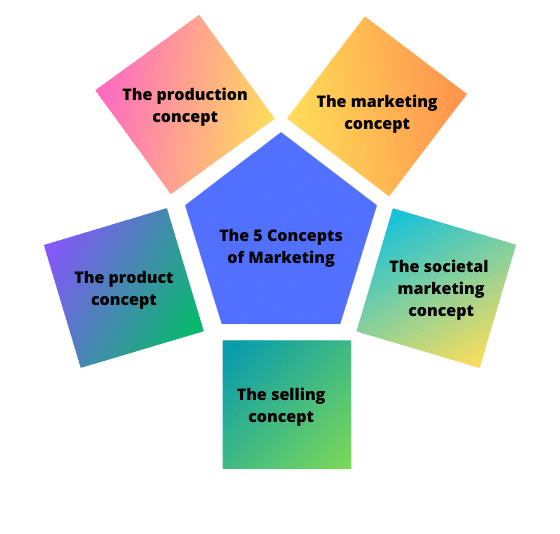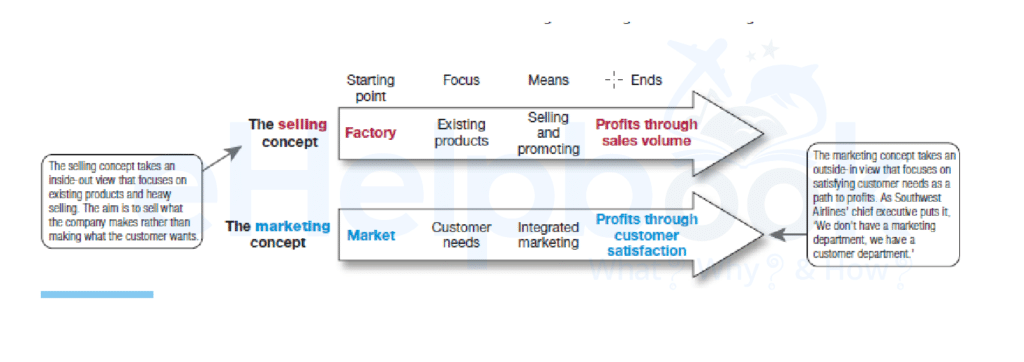What Is Marketing?
Marketing is all-encompassing, from how you brand your product to the tone of voice of your copy, your social media content, and beyond; it is a vast subject.
Marketing is not solely about the act of selling; it also delves into the underlying reasons behind consumer behavior.
It encompasses human psychology and aims to understand why people make purchases and what motivates them to spend their money on a particular product or service.
In this article, we will discuss the five fundamental concepts of marketing and provide examples to illustrate them.
Let’s start with the basics.
- What Is Marketing?
- 1. The Production Concept
- 2. The Product Concept
- 3. The Selling Concept
- 4. The Marketing Concept
- 5. The Societal Marketing
- Which Concept of Marketing Is The Best?
- Nail These Marketing Concepts to Engage Customer Attention
- Marketing Concepts FAQ
What are the 5 main marketing concepts?
The term “concepts of marketing” refers to a broad term that includes various approaches or philosophies utilized to promote a product or service.
These concepts serve as fundamental principles guiding the marketing process. They form the basis for developing strategies and tactics to achieve marketing goals.
Five key concepts form the foundation of marketing:
- The production concept
- The product concept
- The selling concept
- The marketing concept
- The societal marketing concept

These concepts together constitute the basis of marketing. Therefore, it’s worth understanding all of them.
1. The Production Concept
The production concept suggests that people prefer products and services that are easily available and affordable, which is essentially the idea of mass production.
Focusing your marketing efforts on this concept means you’re looking to achieve a highly efficient production process, keep costs low, and aim to scale production.
Think Walmart, McDonald’s (or any of the big, fast food franchises), Forever 21, Starbucks, and countless other big brands you’ll find across the U.S. in every mall, town, and city. They all use this approach.
Brands that focus on mass production keep costs low and sell to a large customer base. Each item sold attracts a low-profit margin, but selling at a very high volume ensures that profit remains high.
That’s why Amazon can offer such low prices on its products, and why H&M can sell clothes at affordable prices.
2. The Product Concept
The product concept emphasizes that buyers prioritize a product’s quality, features, and benefits. Product-focused buyers seek innovation and uniqueness rather than solely seeking the lowest price.
A prime example that exemplifies this type of marketing is Apple. Apple products are renowned for their exceptional user experience.
They are designed to be user-friendly, intuitive, and easy to set up and update. Every aspect, from their sleek packaging to their minimalist design and intuitive controls, exudes elegance.
Apple sets a premium price for their products, but their dedicated fan base is willing to pay for the superior quality and user experience they offer.
When customers purchase an Apple product, they have a clear understanding of what they’re getting. Apple also prioritizes accessibility, which sets their products apart in the market.

Other companies that follow the product concept approach include Bose, a prominent manufacturer of audio equipment, as well as iconic brands like Doc Martens boots and Tag Heuer watches.
You’d be correct if you thought many of the brands I’ve named above are also mass-produced.
These brands operate based on both concepts, but their ingenious marketing strategies create an impression of exclusivity, enabling them to justify higher price points.
3. The Selling Concept
The selling concept is founded on the belief that customers will not purchase an adequate quantity of a product or service unless they are actively persuaded to do so.
This concept assumes that customers tend to be resistant and need to be convinced to make a purchase. Marketing strategies rooted in the selling concept involve pervasive and continuous advertising efforts.
Companies that embrace this concept often employ various techniques to sway hesitant buyers into making a purchase. This approach is commonly utilized by companies that have excess inventory and need to sell it in order to create space for new products.
Examples of employing the selling concept include:
- Brands that aggressively promote Black Friday (and Cyber Monday), such as Amazon, although many big brands also use very similar tactics.
- Brands that heavily rely on email marketing — think of those that flood your inbox with daily emails that advertise discounts, sales, and special offers. These brands constantly strive to capture your attention with their latest deals.
- Cold calling or emailing on a large scale without properly qualifying leads – any tactic that prioritizes quantity over quality, emphasizing that “it’s all about the numbers,” aligns with the sales concept.
- Moreover, aggressively pushing for a sale without adequately assessing a lead’s suitability, disregarding a customer’s refusal, employing manipulative tactics, or making extravagant promises are all indicative of the sales concept.
4. The Marketing Concept
You read it right, one of the 5 marketing concepts is “the marketing concept”. While the selling concept is all about what the company wants or needs, the marketing concept focuses on the customer.
If you’ve hung out in marketing groups or social media pages online, you’ll have heard discussions about concentrating on solving a customer’s problem to build a sustainable business.
Brands that utilize the marketing concept spend time getting to know their customer’s likes and dislikes. They understand what problems keep their customers awake at night and develop products and services to solve those issues.
This is the approach you’ll see small businesses take. While they can’t compete on scale or price with more prominent brands, they can, through a deep understanding of their customer, fill the gaps in the market and meet a niche demand.
You’ll often see this approach with freelancers building small, agile businesses online. Spend time on LinkedIn and engage with content from copywriters, designers, coaches, and consultants, and you’ll see how they interact with their audience — often asking (and answering) questions in their chosen niche.

They’ll then collate that data and develop a product to fill a demand in their market.
A good example of this is those who offer LinkedIn coaching. They work with clients to help improve their LinkedIn profile so that they can bring in new business or land a new role.
Often, these coaches will also have a digital ebook or course that distills their knowledge into an easily accessible and affordable package. They’ve developed these products as a result of demand from their customers.
This approach is not limited to small companies or one-person businesses, though. Larger, more established brands also employ this tactic.
Many SaaS brands interact with their customers through social media, where they maintain a development list populated by customers. This enables them to prioritize feature development put forward by their customer base.
One such example is Infinity, a productivity tool that maintains a public roadmap where you can vote on which features you want to be developed next. You can also see what is in development and what has been publicly released and is now a full feature.
5. The Societal Marketing
The societal marketing concept takes the marketing concept further and is increasingly becoming the concept of choice when devising a marketing strategy.
This concept emphasizes focusing on meeting customers’ needs to solve their problems while ensuring no harm comes to them.
You should also provide this solution as ethically as you can.
Examples of brands and products that focus on this marketing concept include:
- Herbivore and other beauty brands use organic ingredients and claim that their products are ethically produced and do not harm the environment
- Reformation is a clothing brand that focuses on ethically made clothing produced without harm to nature.
Which Concept of Marketing Is The Best?
Well, it depends.
The concept of marketing you choose depends on your business, your product or service, and your relationship with your customers.
There are also several other factors to consider. We must approach some concepts, such as the production concept, cautiously.
Mass production has several issues. It’s usually environmentally destructive and may involve exploiting workers making the product. That is not to say this is the case for all mass-produced items, but it is a reality in numerous instances.
Using this concept as the basis of any marketing effort assumes that consumers are primarily interested in easy access to your product and a low price.
If you’re looking to build a long-term business, you should consider your customers’ needs.
In this day and age of mass consumption, you need to make sure your business practices are ethical. Also, your product is environmentally friendly, and you are addressing the genuine need of your customer.
By incorporating the marketing and societal marketing concepts into your marketing strategy, you establish a solid foundation to foster the long-term growth of your business.
Nail These Marketing Concepts to Engage Customer Attention
To build a strong marketing campaign for your business, it’s essential to understand the five marketing concepts. If you don’t know what your customers need, your marketing efforts are unlikely to succeed.
Trying to close a sale with a reluctant buyer will never end well, and you may see a higher rate of returns and refunds, which could negatively impact your business reputation.
On the other hand, if you’re trying to sell a product with no demand or leads who aren’t ready to buy, you don’t have a viable business.
To avoid these pitfalls, your marketing efforts should focus on targeting the right people, understanding the buyer journey, and offering customers products and services that solve their problems.
Being trustworthy isn’t just the right thing to do, it also makes the most sense for your business.
Ready to rock these marketing concepts and shift your buyers into overdrive?
Check out WriterAccess and gain access to vetted SEO writers and marketing professionals to take your digital marketing efforts to the next level. Try the free two-week trial today.
Marketing Concepts FAQ
What are the 5 concepts of marketing?
The five concepts of marketing are the production concept, product concept, selling concept, marketing concept, and societal marketing concept. Each focuses on different aspects of marketing strategies and consumer relationships.
What are the 7 core concepts of marketing?
The seven core concepts of marketing include production, product, selling, marketing, societal marketing, relationship marketing, and holistic marketing. These concepts cover a broad spectrum of approaches to effectively reach and satisfy customers.
Why is the marketing concept important?
The marketing concept is important because it focuses on meeting the needs and wants of customers, ensuring customer satisfaction, and building long-term relationships. This approach helps businesses achieve their goals by aligning their strategies with consumer demand.
There are 5 or 7 concepts of marketing?
Both numbers are correct, depending on the context. Traditionally, there are five main marketing concepts, but modern marketing includes seven core concepts, adding relationship marketing and holistic marketing to the list.








